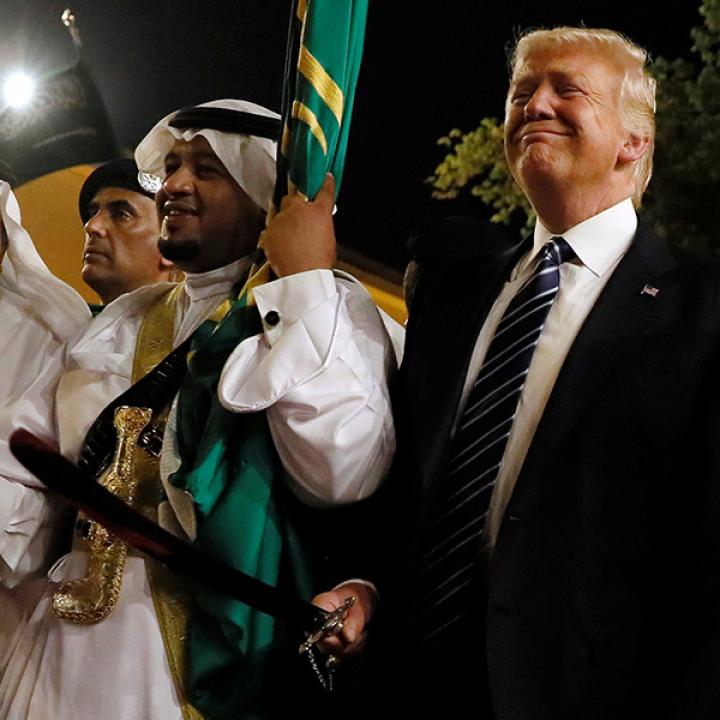
- Policy Analysis
- Articles & Op-Eds
The U.S. and Saudi Arabia Can’t Get a Divorce

Even amid growing exasperation over Riyadh’s behavior, realities on the ground and in the global economy show why the relationship is still crucial.
Few American foreign-policy challenges are more vexing or divisive than relations with Saudi Arabia today. U.S. interests would seem to dictate close ties, but American values argue otherwise. For President Trump, who is all about transactions, it is a no-brainer to focus on arms sales and oil, and little else matters. For Congress, there must be a price for the killing of the dissident journalist Jamal Khashoggi, as well as conduct of the war in Yemen. Congressional attempts to punish the Saudis, including ending all U.S. military support for the Yemen conflict, have been blocked by the White House.
Historically, presidents—Democrats and Republicans alike—have turned a blind eye to Saudi Arabia’s repressive domestic policies, in return for guarantees of a stable oil market. Two things are different today. First, in Congress there is a broad consensus that the Saudis crossed the line and that the administration’s protecting them is simply wrong. Second, the U.S. is increasingly energy-independent and buys little Saudi oil—making many on Capitol Hill believe our stakes in the Saudis are far lower than before.
Leaving aside the reality that there is one pool of energy worldwide, and that a major disruption of oil because of threats or instability in Saudi Arabia would result in the price skyrocketing for Americans and everyone else, there is another countervailing factor in the interests-values continuum with the kingdom that needs to be considered. Saudi Arabia is in the midst of a fundamental transformation of its society and of the sources of the regime’s legitimacy. True, the monarchy retains all political power, but nationalism and modernization are replacing Wahhabism, a rigid, intolerant interpretation of Islam that fueled al-Qaeda, the Islamic State and the recent Sri Lanka church bombings. It is the doctrine that the U.S. and its allies have been fighting around the globe.
The driver of change is Crown Prince Mohammad bin Salman. He is conducting a revolution from above that is discrediting radical Islamist ideology, including the removal of several thousand clerics and dozens of judges deemed to be sympathetic to Qaeda.
The social changes emerging in Saudi Arabia are visible to any visitor—go into any restaurant and see men and women mixing; visit businesses or governmental offices and women are prominent; cinemas are opening; music, forbidden in the strict Wahhabi code, is now played not just privately but in concerts drawing thousands. Even the royal palaces now have women’s restrooms. None of this was thinkable in the past.
Unfortunately, the authoritarianism, the public beheadings, the crackdown on dissent—including the arrests and possibly torture of women activists— also offend our values. Many thoughtful American critics of Saudi policy argue that we must shun the crown prince and reject as a fanciful notion the idea that he is a modernizing dictator.
Having just returned from Saudi Arabia, I am struck by what feels like two totally different universes. The enthusiasm for the crown prince continues to be real, especially among young people who now can talk openly about their ability to shape their destinies and the destiny of the country. Yet the Saudis I talked to—young and old—deeply resent the congressional criticism of the crown prince and feel that if Saudi Arabia is shunned by the U.S., the kingdom will shun the U.S. in return. With nationalism now a pillar of regime support, we should not be surprised by such a backlash.
They may mean it, but is it realistic? Saudi weapons, military infrastructure and training are all dependent on U.S. military support. The kingdom’s investment holdings in the U.S. exceed $800 billion. The vast majority of the 190,000 students and family members sent abroad are in the U.S., and return with instinctive attachments to America. And, case in point, most of the kingdom’s 30-plus cabinet ministers graduated from American universities. They may be angry about the criticism, but their natural affinity is to the U.S.
By the same token, how easy would it be for the U.S. to truly shun Saudi Arabia? Even if Americans were to downplay the security implications, which they should not, are they ready to have the Saudis stop insisting that all transactions in oil be done in dollars? How long would 70 percent of all global trade be done in dollars if that were to change?
With neither side having a national interest in shunning the other, the issue is how each will now manage the relationship. The Trump administration needs to be honest with Congress and the Saudis: We will remain committed to Saudi security and to investing in the kingdom’s effort to transform the country, even as we make clear we will criticize what we believe is wrong. Killing dissidents and defying global norms has consequences. Disallowing domestic criticism will undermine the aims of building a knowledge-based economy and a risk-taking, entrepreneurial society. Countering Iranian and Sunni Islamist radicals is essential, but needs to be coordinated to avoid ill-considered, reckless policies.
Washington will need help from the Saudis, with the crown prince repeating his words that the Khashoggi murder was a “heinous crime,” and explaining the lessons learned and structural changes made because of it. The Saudis should also seek a quiet discussion with congressional leaders to hear their criticisms, respond to them and voice their own.
The Las Vegas rules don’t apply to the Middle East: What happens there does not stay there. And, like it or not, policies of the Saudis will have a huge effect on what takes shape in the Middle East. America can’t write them off.
Dennis Ross, the William Davidson Distinguished Fellow at The Washington Institute, served in senior national security positions during the Reagan, Bush, Clinton, and Obama administrations.
Bloomberg



